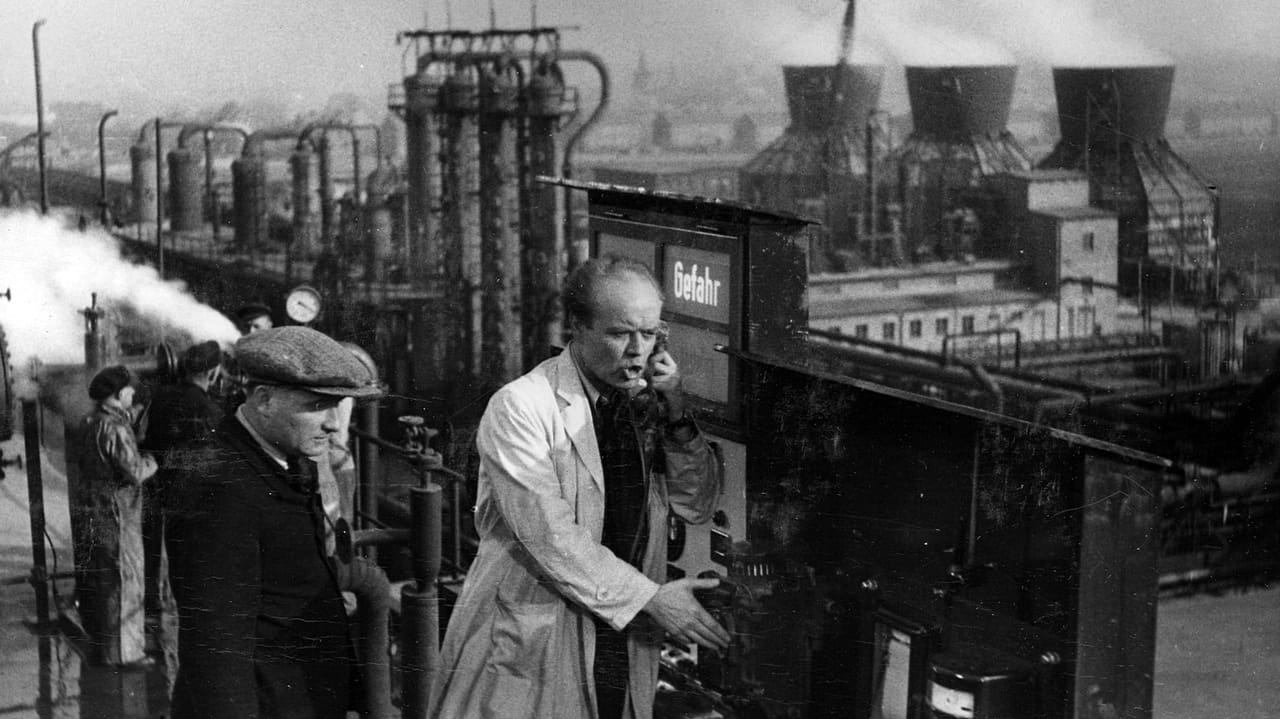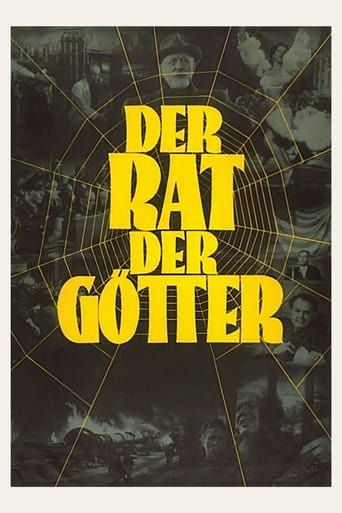

This is a 65-year-old movie which runs for roughly 105 minutes. Or you could also say, it is a movie from five years after the end of World War II. Or you could say it is a DEMA movie that was made immediately after the GDR came into existence. The core of the film is what I wrote in the title. It is almost entirely about what happened the years before, especially all the dead people in concentration camps and how the existence of these camps was perceived, if people knew what was happening there etc. There is also a scene near the end where basically everybody who was somewhat guilty pretends he didn't know what exactly was going on and puts the blame on other people. A big part of the film plays at a chemical factory where gas was produced that was also used to kill people in the camps. The main character is a renowned chemist, still an honorable man though and his bosses are the really evil people.Apart from his profession, he also struggles with his family, especially his son, who decides to keep working in the factory after the end of World War II, even if the same ruthless people are in charge there. When the staff is order to keep producing explosives in the factory, a catastrophe happens and hundreds of people lose their lives. The bosses (who call themselves in the most modest manner "Council of the Gods") say it was an accident with an ether cloud and nobody is to blame, but the color of the cloud tells the truth about their despicable motives in the end. So this is also a story on greed. I thought all the actors were great and even if I am not the biggest fan of old black-and-white movies I really enjoyed watching this. Maybe the very last camera shots were a tad too GDR-patriotic for my taste, but this does not hurt the overall perception at all. Recommended and a positive surprise as the writer trio was not too prolific really in terms of writing for film when this was made. On a side-note, the film's score comes from famous German composer Hanns Eisler. And the film's director died only three years ago at the age of 101.
... View More"Der Rat der Götter" ("Council of the Gods") is based, at least in part, on the book "I.G. Farben" by American author, Richard Sasuly--who based it on testimony during the Nuremberg trials. However, considering that the film was a joint Soviet and East German effort, I wonder how closely the film sticks to the facts--especially since the focus of the film is often on the evils of corporations and the goodness of labor unions and the communist party in Germany. Obviously the West Germans and Americans weren't interested in making such a film, as the Cold War was in full swing. And, obviously the Soviets and East Germans wanted to make the capitalist systems look bad. So what is the real truth here? I have no idea--but it does make for a compelling film--whether or not it's accurate or if the facts have been twisted to make the anti-capitalist point. One example of such manipulation was as showing actual footage of a chance explosion at the BASF plant and saying it was of the Farben plant--which did not explode. The next ten minutes was a diatribe against capitalism--and a relatively shallow one at that. Also, the film saying the company in question was pro-Hitler was unfair because they actually contributed to MANY political groups--not just the Nazis. Still, considering the East Germans based this on finding of American investigators makes me think the basic plot is accurate.I noticed that one reviewer felt the film was dull. I didn't find it that dull but could understand their sentiments. It's a film that is rather talky much of the time and most of the action consists of just a few pieces of stock footage from WWII scattered here and there. However, I found the movie fascinating because anti-Western propaganda films are rarely seen in the US and it was a rare glimpse into the Soviet Bloc world. Plus, the film did have a compelling message about internationalists and corporations profiting from and loving war. Sure, it twisted a few facts here and there--but it did heighten the suspense and added to the impact. And it did get its message across well.By the way, there is a short documentary in which the film maker talks about the film. He stands by the accuracy of the film overall but admits some 'artistic license' was used as well.
... View More"The riveting story of the collaboration between Nazi scientists and chemical giant IG Farben"? Perhaps.There would be few movies with a cast of more morally bankrupt characters than this. A classic of cold war propaganda (1950), and dedicated to "the friends of freedom all over the world" it is of some passing interest.Read all about it! Brilliant young scientist, idealist with a social conscience who is appalled by the company's manufacture of poison gas, rocket fuel and explosives Manipulative industrialists who conspire to support Hitler; their sole aim to line their own pockets with the massive profits to be had from travelling hand in glove with the military Corrupt American companies and officials in cahoots with these unscrupulous barons, willing partners in a war against the real enemy – communism!Oh dear, such a band of stereotypes. The American connection, one Mr Lawson, is the go-between for US interests both industrial and governmental in war-time Germany. He is a ringer for Boris Badenov, I kid you not. AND watch out for Mabel, his wise-cracking associate. She must be heard to be believed. (German is obviously not her mother tongue, and if you're familiar with Glenn Miller in his famous radio conversations with Ilse Weinberger, you'll know how painful it can get.)In the Nuremberg courtroom the whole collusion scandal is set to explode, but between personal massages in their cells and a total disregard for any judicial process (knowing the prosecution case has been fixed from high up so as to not ask the tough questions), the buck is passed down the line. No-one – owners or directors - has any knowledge of just what terrible shenanigans those evil Nazis got up to with the company's inventive concoctions. "Doctor, this line of questioning is making me unwell, please wheel me outside."And so the Council of the Gods – the grand title the industrialists gave to themselves – is ultimately slapped on the wrist with a limp lettuce leaf, neatly sidestepping any penalty for their crimes. Their fortunes remain at their disposal in Switzerland. They are merely waiting for the right opportunity.Returning to the company's massive factory complex at war's end (left completely untouched by allied bombing, thanks to the secret deals between Mr Lawson, the Council and the US government – you gotta love the accuracy of their bomb-sights), our idealist scientist organises his fellow researchers in the manufacture of items beneficial to mankind – not plasma screens, but fertilizers and the like. All looks set for a reclaiming of the moral high ground, an atonement for past sins and the establishment of a post-war worker's utopia, when in step the shadowy figures who control the money and the big political agenda. The original regime is reinstated and so too is the production of sinister matériel.Down the line, there is an explosion of Krakatoan proportions, a confrontation between labour (led by our young idealist) and the bosses, and a finale that would not have left a dry eye in the house (or a dry seat depending on where one's allegiances lay).I found the first half of this movie to be somewhat turgid, as the behind-the-scenes machinations were played out by comically ruthless, dandified, and utterly one dimensional figures. As the Nuremberg scenes progressed and the success of the military industrial conspiracy became apparent, there were some redeeming factors and the pace quickened.Worthwhile if only to get a glimpse at what the other side was thinking about life at the big end of town in the Third Reich, and for a cavalcade of the most dastardly villains. It is quite heavy handed in its techniques and is by no means a cinematic gem. An attempt yes to portray the same dilemmas and post-war introspection as classics such as Rotation, The Second Track and The Murderers Are Among Us, but with nowhere near their level of finesse and poignancy.
... View MoreUsing the Nuremberg trials as source material, this film looks at how German businesses colluded with the Nazis and centers on the crisis of conscious from the scientist that developed of the poison gas used in the concentration camps. Great idea but it's propagandistic and tries very hard to atone for the sins of the Nazis. Lots of weak drama mixed in with real war and atrocity footage. Perhaps it played better in 1950? It makes no bones about the international industrial machine that fed Germany during the war, explaining how goods traveled from country to country to make their way into German hands, with Standard Oil being singled out as a major accomplice. It's just like buying American products in Iran today. War is good for business.
... View More